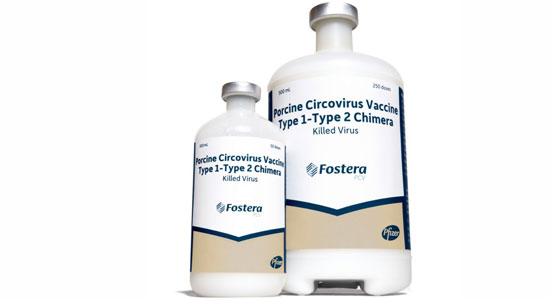 Veterinarians and pork producers can now help prevent Porcine Circovirus Type 2 (PCV2) viremia with the convenience of a single dose. New Fostera™ PCV from Pfizer Animal Health is the result of the company's commitment to best practices and continuous quality improvements.
Veterinarians and pork producers can now help prevent Porcine Circovirus Type 2 (PCV2) viremia with the convenience of a single dose. New Fostera™ PCV from Pfizer Animal Health is the result of the company's commitment to best practices and continuous quality improvements.
"Nearly all pigs are exposed to PCV2 during their lifetime, so the goal is to create an environment with the least amount of virus present," says Darrell Neuberger, DVM, pork technical services veterinarian at Pfizer Animal Health. "A challenge study demonstrated a single dose of Fostera PCV vaccine reduced the amount of PCV2 in the blood up to 10,000 times compared to non-vaccinated pigs."1

PCV2 viremia can compromise herd health, performance and pounds per pig at market.
"Maintaining a low to non-existent PCV2 viremia level can enable the immune system to help fight other diseases more effectively and allow animals to grow more successfully," explains Neuberger.
Fostera PCV also helped provide protection against PCV2 infection in lymphoid tissues, while helping reduce lymphoid depletion in pigs challenged with virulent PCV2.
Porcine circovirus and mycoplasmal pneumonia are two of the costliest diseases affecting pork producers.2 Helping provide protection before disease exposure is critical to the success of any vaccination program, explains Neuberger.
Studies show that pigs are typically infected with Mycoplasma hyopneumoniae within the first three weeks of their life - through exposure from the dam during lactation or through exposure to older pigs.3-5 Vaccinating after this point can leave a gap in protection.
"RespiSure-ONE® at processing and Fostera PCV at weaning help fill a gap in protection without compromising convenience," says Neuberger.

1. Data on file, Study Report No. 3420R-60-10-885, Pfizer Inc.
2. Holtkamp D, Rotto H, Garcia R, 2007. Economic Cost of Major Health Challenges in Large US Swine Production Systems. In Proc. Of Amer. Assoc. Swine Prac.85-89.
3. Fano E, Pijoan C, Dee S, Deen J. Effect of Mycoplasma hyopneumoniae colonization at weaning on disease severity in growing pigs. Can J Vet Res. 2007;71:195-200.
4. Sibila M, Nofrarias M, Lopez-Soria S, Segales J, Riera P, Llopart D, Calsamiglia M. Exploratory field study on Mycoplasma hyopneumoniae infection in suckling pigs. Vet Microbiol. 2007;121:352-356.
5. Connor JF. Early pig vaccination disease breakthrough. National Hog Farmer. 2009;27.


